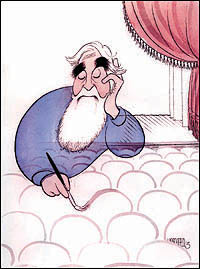Prior to resigning his post as Senate Republican Leader, as part of his Nationwide Contrition Tour, Senator Trent Lott sat for an imaginary interview with SEMITRUE NEWS…
SEMI: Welcome Senator, thank you for talking with us.
LOTT: I’m sorry.
SEMI: I said, thank you for talking with us.
LOTT: I know, I’m just saying I’m sorry.
SEMI: …Let’s cut to the chase. In 1948, Strom Thurmond ran for President on a pro-segregationist platform. As everybody in the entire world now knows, at a celebration honoring the senator, you mentioned that your home state of Mississippi was one of four southern states that voted for Thurmond and added “We’re proud of it. And if the rest of the country had followed our lead, we wouldn’t have had all these problems over the years.”
LOTT: I did say that, and I apologize for it.
SEMI: Many people have interpreted that statement to mean that you feel we’d all be better off if those uppity black folk hadn’t insisted on being able to sit in the front of the bus, drink out of the same water fountains, and become Secretary of State.
LOTT: I know, and I apologize for that. But I wasn’t referring to those racial and discarded policies of the past. I was referring to other social and economic discarded policies of the past.
SEMI: During his 1948 campaign as a “Dixiecrat”, Thurmond charmed us with original Southern homilies such as “All the laws of Washington and all the bayonets of the Army cannot force the Negroes into our homes, our schools, our churches”. Do you mean to tell us now that you weren’t thinking of any of that when you said that we’d all be better off if he had been elected President?
LOTT: That was an unfortunate statement, but Senator Thurmond ran on a broader platform of states rights, individual liberty, fiscal responsibility, a strong national defense and a balanced budget
SEMI: And you just forgot about all that Jim Crow stuff.
LOTT: Well I was very young at the time, maybe seven or eight years old, and I’ve apologized for that.
SEMI: Many of your supporters have tried to dismiss the comments made a few weeks ago as simply a poor choice of words, until it was revealed that in 1980, at a rally in Jackson, Mississippi, you mounted the stage right after Thurmond spoke and said essentially the same thing: if the country had elected Thurmond to the presidency “30 years ago, we wouldn’t be in the mess we are today.”
LOTT: Yes, but I was very young at the time, maybe 39 or 40 years old, and I’ve apologized for that.
SEMI: Again, some of your supporters are dismissing these questions as pure political opportunism, but what many people find disturbing is that a man in your position, who says such things that he later attempts to shrug off as merely being “insensitive”, shows through his voting record that he has never been a supporter of civil rights.
LOTT: I apologize for my voting record.
SEMI: You voted against establishing Martin Luther King Day as a federal holiday…
LOTT: I apologize for that.
SEMI: You voted against extending the Voting Rights Act…
LOTT: I apologize for that too.
SEMI: While a Congressman in the late 70’s, you supported a constitutional amendment to prohibit school busing.
LOTT: Oh yeah, big apologies for that one.
SEMI: You filed a friend-of-the-court brief with the Supreme Court to support a tax exemption for Bob Jones University, a segregationist institution with rules discriminating against minorities and prohibiting interracial dating, arguing that “racial discrimination does not always violate public policy” and implying that such policies could be protected under the First Amendment.
LOTT: Phew, yeah boy, really insensitive on that one. Just a big heap of apologies for that.
SEMI: You were one of only four senators that voted against a bill requiring the Justice Department to compile hate-crime statistics based on attacks motivated by prejudice and race.
LOTT: I don’t know what I was thinking. Definitely discarded policies of the past. I apologize for that.
SEMI: In 1995, Rep. Bennie Thompson (D-Miss.) hoped to use his influence to press the FBI to provide documents related to the 1966 murder of civil rights activist Vernon Dahmer to a local prosecutor who was seeking to reopen the case. The original 1968 jury had not been able to reach a verdict against the only suspect, a former Imperial Wizard of the Ku Klux Klan in Mississippi, and he had been free for nearly 30 years. You publicly rebuked Thompson, who is black, and told reporters: “Bennie Thompson would do well to tend to his job in Washington . . .”
LOTT: Did I say that? Geez, I must have been having a bad day. I apologize.
SEMI: Your critics point to decisions that you have made both as an elected representative and as a private citizen to discern a personal pattern of racial bigotry and discrimination. For example, as President of the intra-fraternity council at “Ole Miss” when you were a college student in the early 1960’s, according to Time magazine, you helped lead a successful battle to prevent your college fraternity from admitting blacks to any of its chapters.
LOTT: I did do that, and I have since seen the error of my ways. And I apologize for that.
SEMI: One more example. For many years, you have been associated with a group called the Conservative Citizen’ s Council (or CCC, not to be confused with the similar-sounding KKK) a self-described advocacy group for “white European-Americans” that opposes “schemes by leftwing militants to rob white Americans of their rights and heritage”. In 1992, you concluded your keynote speech at the Council’s national board meeting by gushing that “the people in this room stand for the right principles and the right philosophy.” You have hosted private meeting with Council leaders, attended CCC banquets in your honor, and for eight years wrote a regular column for their magazine, Citizen’s Informer. Yet when publicly confronted with the openly racist views of this group and your association with them, you claimed that you had “no firsthand knowledge” of the CCC. Can you explain that?
LOTT: No, I don’t think anyone benefits from my trying to explain things. Right now, my focus is on apologizing.
SEMI: Allow me then to give you some “firsthand knowledge” of the CCC. An editorial on their website proposes a U.S. Government-sponsored program to send African-American prison inmates “back” to Africa, and the “repatriation” of such prominent black intellectuals as Cornell West, Maya Angelou, and Toni Morrison. Are these the kind of “problems” you think a Thurmond presidency might have solved? Do you think Cornell West should be sent to Africa?
LOTT: Well, I have never met Cornell West so I don’t really have an opinion, and I apologize for that.
SEMI: Senator Lott, do you personally know any actual black people?
LOTT: J.C. Watts of Oklahoma is a good friend of mine, he’s a fellow Republican, I respect him as a Senator, and I am barely frightened of him at all. And of course, I have hired many Negro-Americans on my staff. You know, on a Friday night, after a long week of work, there’s nothing I like more than relaxing with some of my home boys, maybe knock back a few pint-sized malt liquors, and reflect on how difficult it is to be in the minority.
SEMI: You know what that’s like to be a minority?
LOTT: Absolutely! I just spent two years as Minority Leader in the Senate, so I have a deep appreciation for what it’s like to be oppressed by The Man.
SEMI: “The Man”, in this case, being…?
LOTT: Senator Jim Jeffords of Vermont.
SEMI: Thank you, Mr. Lott. I think all of my readers now have a better understanding of how you think.
LOTT: I certainly hope so, and I apologize.
 For a generation of men who fought in WWII, Bill Mauldin’s cartoons in Stars & Stripes — particularly Willie and Joe, the immortal infantrymen — depicted their own soldiering experience: downtrodden, grubby, often dazed, but always ready to hike into the mud and do their job. Mauldin’s seemingly anti-authoritarian views often got him in trouble with the Army brass. At one point, he was called into a private meeting with General Patton, who is reported to have yelled “What are you trying to do, incite a goddamn mutiny?” Mauldin wrote that he marched out of the room feeling like he had an agreement with the General, and he went right on creating his cartoons his own way. In 1945, he published a collection of his WWII cartoons, Up Front With Mauldin, which garnered him the Pulitzer prize.
For a generation of men who fought in WWII, Bill Mauldin’s cartoons in Stars & Stripes — particularly Willie and Joe, the immortal infantrymen — depicted their own soldiering experience: downtrodden, grubby, often dazed, but always ready to hike into the mud and do their job. Mauldin’s seemingly anti-authoritarian views often got him in trouble with the Army brass. At one point, he was called into a private meeting with General Patton, who is reported to have yelled “What are you trying to do, incite a goddamn mutiny?” Mauldin wrote that he marched out of the room feeling like he had an agreement with the General, and he went right on creating his cartoons his own way. In 1945, he published a collection of his WWII cartoons, Up Front With Mauldin, which garnered him the Pulitzer prize.